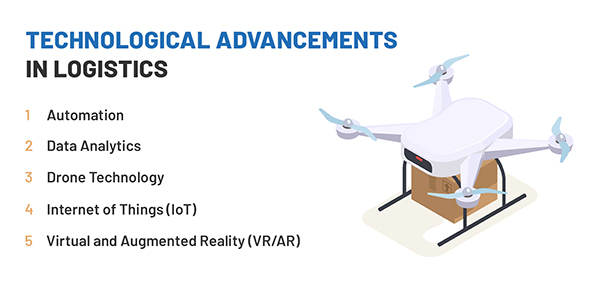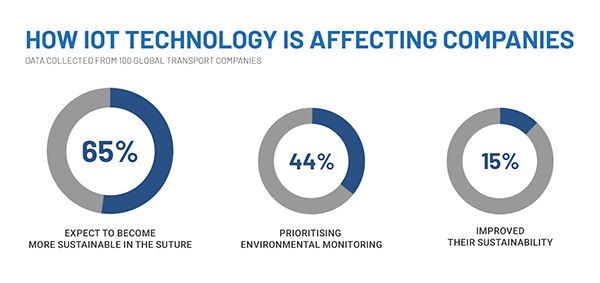
Five Benefits of Investing in Logistics Technology
Time to read: 6 minutes
Transportation and logistics businesses constantly seek innovative strategies to boost flexibility, sustainability, and transparency. These are necessities now for eCommerce operations as supply chains broaden their worldwide reach. Adopting emerging technology is essential to help online merchants financially and operationally.
These cutting-edge tech solutions increase supply chain effectiveness, productivity, and cost-effectiveness. It impacts everything from initial product development to “last mile” delivery alternatives.
Within the supply chain, traditional logistics management frequently occurs as a separate silo. The logistics division is divided into smaller teams that operate separately and only collaborate when necessary.
In a perfect world, this setup functions quite well. The forecasting division uses the analytics team’s data to assess demand and forecast sales. Marketing aims to balance supply and demand while growing the company’s market share. There are roles in other departments as well.
However, this approach has one significant drawback: a lack of coordination. Roadblocks occur when each link in the chain operates independently without being aware of what the other departments are doing. There are no shared objectives for solving issues. Therefore, problems from one area can quickly spread to another. For instance, forecasting errors can readily be transferred to marketing, which could then affect sales.
This implies that problems that otherwise could be easily solved in a collaborative setting will continue to inconvenience the business longer.
Information technology (IT) has drastically changed the transportation and logistics sector. IT has sped up, reduced costs, and improved shipping efficiency by automating procedures and enhancing communication.
Five Benefits of Using Logistics Technology
The advancement of logistics technology is pushing boundaries and transforming eCommerce. Online consumers are accustomed to getting everything readily online. Depending on their location, expedited and same-day shipping is expected. It’s not uncommon for customers to receive items they ordered online on the same day they purchased them.
Improved technology has reduced costs and errors while increasing supply chain productivity. The logistics sector benefits from these developments, from shipping, supply chain management, international shipping (by air and sea), and trucking.

How Technology Benefits Logistics Companies(& Handy Tech Advancements) (itsasap.com)
1. Efficiency Through Automation
Technological breakthroughs such as robotics, sensors, tracking software, and automation build a “touchless” supply chain infrastructure. Logistics managers can streamline operations and automate maintenance with artificial intelligence (AI), machine learning (ML) algorithms, and sophisticated computer-based analytics and software. With these solutions, productivity is increasing across all market categories.
The workforce can focus on higher-level work as robotic process automation (RPA) frees them from mundane tasks, such as data entry, number crunching tasks, and more. RPA can do it more precisely and efficiently. Automation also produces more accurate results with lower chances of mistakes. This, in turn, will help your business avoid any errors, which increases customer satisfaction.
2. Transparency & Visiblity
Full product tracking from the factory to the final delivery location increases supply chain visibility. End-to-end stakeholder visibility is possible through cloud-based communication systems, fast internet, cutting-edge software, sensors, and other logistics technology services.
Software, in particular, helps with the centralized management of information. Operators may fully understand their supply chain, including manufacturing, purchasing, assembling, distributing, and last-mile delivery. Greater visibility allows for more precise forecasting, and analyzing past data helps decision-making.
3. Lower Costs
Productivity-enhancing technology lowers costs while also boosting services. There’s reduced reliance on human interaction and an increased emphasis on information technology throughout the supply chain. Sensor devices, tracking software, and barcoding technology make it possible.
AI and ML software can shorten shipment times by optimizing delivery routes. Such tools assist online merchants in making choices that result in efficient cost-reduction plans.
Although some technological solutions may initially appear expensive, they offer a significant return on investment. The low cost of implementation, particularly for software solutions, is a substantial factor in this. Hardware solutions are becoming affordable with technological advances, increased competition, and widespread adoption. Another element contributing to the technology solutions’ high return on investment is their exponential benefits.
4. Flexibility and Agility
Organizations that use logistics technology can adapt quickly to changing market conditions. This makes adapting to changing market demands easier and helps businesses expand market share, revenue, and profitability.
With improved access to information and simulations, online merchants can quickly solve issues or develop new business opportunities faster. An acute understanding of KPIs and customer data helps make sound business decisions. You won’t be able to operate quickly if your organization, processes, or systems have multiple roadblocks. You must monitor events throughout the supply chain, assess effects, and develop preventative measures.
Some of the best logistics technology will suggest the “best” actions, which you can apply as soon as they become available. This is a must-have feature in the fast-paced business environment of modern eCommerce.
5. Better Customer Experience
Customers can now monitor the progress of their deliveries in real-time. They can receive timely updates when their orders arrive, thanks to online tracking and delivery statuses. Your customers no longer have to worry about late deliveries, which helps to lessen their anxiety.
Technology has also enabled businesses to provide various consumer-friendly services, including same-day and flexible delivery options.
Increased service levels and consistently meeting client expectations boost retention and satisfaction. eCommerce buyers prioritize speed and efficiency, with 88% of consumers being willing to pay for a same-day delivery service.
Practical Examples of Logistics Technology for eCommerce
Regardless of your industry, technology is the backbone of all businesses. However, in logistics, cutting-edge technology keeps you one step ahead of the competition.
The demands of a continuously changing eCommerce environment strain the transportation and logistics sectors. These businesses face issues such as the demand for increased sustainability, omnichannel shopping, and rapid urbanization. However, there is room for expansion, just as in any sector under pressure. Innovation offers you the next chance to grow.
Internet of Things (IoT) and Radio Frequency Identification (RFID)
Modern devices incorporate sensors and Wi-Fi capabilities into numerous products, including cars, ceiling fans, and cell phones. The Internet of Things is called as such because everyone has easy access to Wi-Fi and the Internet, which connects them to everything. IoT provides the supply chain with numerous opportunities, including cutting costs and delays by avoiding risks.

The Impact of Space Data on Smart Transport & Logistics | ESA Business Applications
A dispatcher or alarm system that monitors and tracks is connected to sensors inside cabins, cargo ships, railroads, and even autonomous vehicles. Your staff receives real-time information from these sensors, giving them an understanding of potential threats.
While IoT is nothing new, it still significantly impacts eCommerce logistics. Businesses frequently utilize RFID technology, which has been around for a while, to manage their inventory as it saves time and effort.
A product is given a tag or sensor, and radio waves are broadcast. After receiving the data, the warehouse and fulfillment staff process it. Bar codes and RFID tags are pretty similar. However, as information is delivered quickly and data is processed with RFID, it appeals to fast-paced businesses.
To monitor shipping containers, online merchants utilize RFID tags in their distribution facilities.
Artificial Intelligence
AI has recently become a hot topic, with generative language models and image generators becoming popular with the general public. Artificial intelligence also has a lot of benefits and real-world use for logistics. AI is the replication of human intellectual functions by machines and computers.
AI-led automation is utilized as a predictive tool in the supply-chain context to manage warehouses, identify changes in demand, and avoid shortages and surplus problems. AI can significantly lower the possibility of human error.
Robotics and computer vision can be used to automate mechanical tasks. Additionally, helpful bots can enhance the customer shopping experience.
Transportation Management System (TMS)
A TMS is a logistics platform that assists eCommerce companies in organizing and optimizing the flow of their products. This system is often included in a broader Supply Chain Management (SCM) system.
TMS is mainly used to manage carriers and optimize delivery routes. Additionally, they help secure payments, print and save documentation, and track shipments in real-time. On top of that, it expedites the shipping process from start to finish.
Keeping up with the most recent tech trends is essential for maintaining efficiency and competitiveness. The latest in logistics technology is providing enormous benefits to eCommerce merchants. These tools will only get better as new developments are created.
ZhenHub accelerates your eCommerce business’ growth with the help of advanced logistics technology. Get end-to-end eCommerce fulfillment with our network of global warehousing partners and inventory management software. Sign up at our website and get started with our easy-to-use platform.